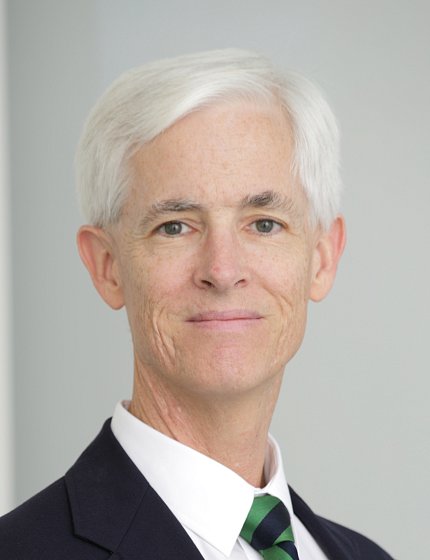NIDCD Scientific Director Griffith Steps Down

Following 22 years of dedicated service to the intramural research program at NIH, Dr. Andrew J. Griffith will step down in late spring to take an academic leadership role at the University of Tennessee Health Science Center in Memphis.
An esteemed geneticist and otolaryngology head-and-neck surgeon, Griffith has spent two decades as a principal investigator at the National Institute on Deafness and Other Communication Disorders, during which he led the NIDCD intramural program as scientific director for 11 years. Dr. Thomas B. Friedman, an NIDCD principal investigator who leads studies on molecular and human genetics, will serve as acting scientific director until a permanent scientific director is named.
NIDCD director Dr. Debara Tucci said, “Andy’s time at the NIDCD was more than valuable, it was vital. He not only shared his passion and vision for science at the Intramural Research Program; he also deftly led it into a modern age of diversity, productivity and excellence in research training.”
While serving as NIDCD scientific director, Griffith fostered high-risk, high-reward science, particularly in translational and clinical research. He encouraged scientists to take advantage of the Clinical Center’s resources to perform clinical trials, and he established the NIDCD Otolaryngology Surgeon-Scientist Program to train clinicians to conduct research. He also facilitated the establishment and administration of new core facilities covering advanced imaging, genomics and computational biology and mouse auditory testing. These facilities provide NIH intramural investigators with easy access to essential resources.
Griffith had a major impact across NIH and beyond, serving as a spokesperson for NIDCD in NIH, congressional and public settings. He served in many leadership roles at NIH. Notably, he played a major role in the response to the NIH Red Team report, as well as the reorganization of intramural clinical research as NIH deputy director for intramural clinical research, a post he has held since 2016.
Griffith joined NIH in 1998 as a member of the senior medical staff of the Clinical Center. He then came to NIDCD as a senior staff fellow and received additional training with Friedman. Since 2000, Griffith has served as chief of the Otolaryngology Branch and the molecular biology and genetics section of the NIDCD intramural program. He made seminal contributions to the understanding of the genes, molecules and processes involved in hearing and hearing loss.
His laboratory conducted pioneering studies that led to the discovery of the TMC gene family and demonstrated that the TMC1 and TMC2 genes encode protein components of the mechanoelectrical transduction channel of inner ear sensory cells. The components of this channel had proven elusive to the hearing research community for many years.
Griffith has received many honors, including a 2002 Presidential Early Career Award for Scientists and Engineers. He has also received two NIH Director’s Awards in the past 3 years for his distinguished service.
Griffith earned a B.S. in chemistry from the University of California, Davis, and an M.D. and Ph.D. from Yale University. He completed an otolaryngology-head and neck surgery residency at the University of Michigan.
“I will miss many things [about NIDCD],” said Griffith, “but what I will miss the most are the people, including my colleagues and co-workers at NIDCD across NIH, and the brave and generous patients and their families that I have had the privilege to work with at the NIH Clinical Center.”
